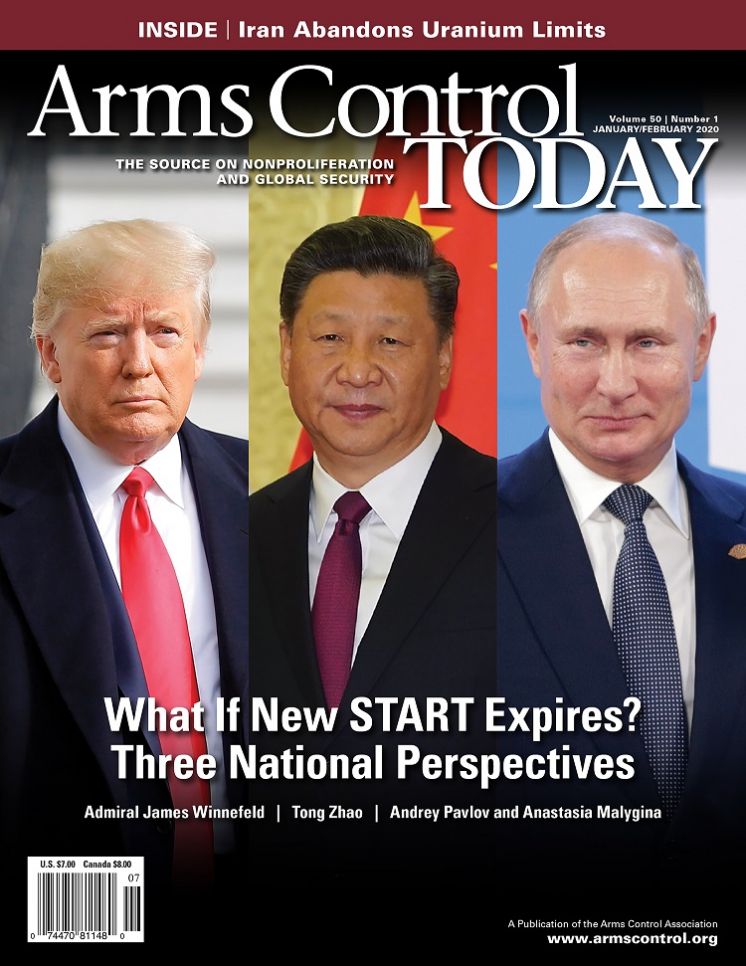Arms Control Today, News in Brief, January-February 2020
The publication of the News in Brief section of Arms Control Today magazine is a joint project of the Center for International Security and Policy and The Arms Control Association.
France Seeks Dialogue on Post-INF Treaty Arms Control
French President Emmanuel Macron has rejected Russian President Vladimir Putin’s proposal for a global U.S.-Russian moratorium on deploying intermediate-range missiles, but emphasized that Paris remains open to dialogue with Moscow.
“We did not accept the moratorium offered by Russia, but we considered that we should not just ignore it because it was open for discussion,” Macron said at a Nov. 28 press conference alongside NATO Secretary-General Jens Stoltenberg. It is in France’s interest, he said, to discuss such matters of security in a dialogue with Russia. NATO previously rejected Putin’s proposal in September, calling it not “credible.” (See ACT, October 2019.)
Macron also argued that Europe must be involved in any potential agreement that might replace the INF Treaty. “We cannot leave our security into the hands of a bilateral treaty to which no European country would be part of,” Macron stated.
Kremlin spokesman Dmitry Peskov said on Dec. 4 that Moscow supported Macron’s argument that Europe must be involved in the talks for any replacement arms control agreement. A day later, Putin commented in a meeting with defense officials that, apart from Macron, “[t]here is no response from our other partners. This forces us to take measures to counter these threats.”
At the end of the NATO leaders meeting Dec. 4 in London, the heads of state issued a declaration stating, “We are addressing and will continue to address in a measured and responsible way Russia’s deployment of new intermediate-range missiles, which brought about the demise of the Intermediate-Range Nuclear Forces Treaty and which pose significant risks to Euro-Atlantic security.” – KINGSTON REIF and SHANNON BUGOS
Senator Refreshes Hold on Firearms Export Changes
Trump administration proposals making changes to how certain firearms are exported were put on hold in December, just days before they could have been published. It was the second time in 2019 that Sen. Bob Menendez (D-N.J.), ranking member on the Foreign Relations Committee, asked the administration to delay the changes.
His Dec. 10 request came one day after the final version of the National Defense Authorization Act was announced, which dropped a House-approved amendment to prohibit the changes. (See ACT, December 2019.) The latest version of the revised rules had been sent to Congress on Nov. 12, starting a 30-day clock before they could be formally published. The administration can now choose to ignore the hold, risking upsetting Menendez and others.
Under the proposed rules, export controls for semiautomatic and nonautomatic firearms and their ammunition, as well as certain other weapons, would be moved from the State Department-led U.S. Munitions List to the Commerce Department-led Commerce Control List. In making such a change, Congress would no longer receive notifications of proposed sales.
As he did in a letter dated Feb. 22, when he first had placed a hold on the proposed rules, Menendez insisted that Congress continue to be notified. He indicated, however, that he would no longer insist on a hold related to 3D printing concerns. Revised rules proposed in November said that the Commerce Department would mandate licenses for online publication of 3D printing plans. Menendez still indicated concern and demanded that Commerce “maintain a policy of ‘presumption of denial’ for any license application." – JEFF ABRAMSON
BWC States Discuss New Technologies
States-parties to the 1975 Biological Weapons Convention (BWC) discussed the implications of emerging technologies and strategies to bolster emergency preparedness during their annual meeting in Geneva on Dec. 3–6.
The BWC bans the development or possession of biological weapons, but rapid advances in the biotechnology field require treaty participants to keep abreast of developments that could have military applications. The treaty has 183 states-parties and four signatory states. Only 10 states have not signed the treaty.
One expert recently stressed the BWC’s fundamental role in creating a global norm against the use of biological weapons. “Any government with any life science capability can now sequence and synthesize whatever it would like to do. Genomes can be engineered to give them new, potentially dangerous characteristics, transforming pathogens that are now benign into pathogens that have the ability to spread or be lethal,” said Tom Inglesby, director of the Center for Health and Security at Johns Hopkins University, in Nov. 20 testimony before the Senate Armed Services emerging threats subcommittee. To adequately respond to genome sequencing and other emerging, destabilizing technologies, Inglesby advocated for governmental efforts to strengthen the BWC and its implementation by states. – JULIA MASTERSON

